NY Attorney General Gets Pushback on Cryptocurrency Inquiry
[caption id="attachment_8354" align="alignnone" width="620"]

New York State Attorney General Eric Schneiderman. Photo: Rick Kopstein[/caption] New York Attorney General Eric Schneiderman’s Investor Protection Bureau sent letters and questionnaires this week to 13 cryptocurrency trading platforms seeking information on operational controls, money laundering and privacy practices, but at least one company said it won’t comply, and a financial services regulation expert called the attorney general’s action “extraordinary.” The companies receiving the questionnaires included Coinbase; Gemini Trust Co.; bitFlyer USA Inc.; and 10 others. The Attorney General's Office imposed a May 1 deadline for compliance.Jesse Powell, CEO and co-founder of Kraken FX, a major cryptocurrency exchange based in San Francisco, issued a statement on Twitter on Wednesday saying that the company would not comply. Powell said in the tweet, “Somebody has to say what everybody's actually thinking about the NYAG's inquiry. The placative kowtowing toward this kind of abuse sends the message that it's ok. It's not ok. It's insulting,” and the “resource diversion is massive.” Powell also tweeted that upon receiving the 34-point inquiry, “I realized we made the wise decision to get out of New York three years ago and that we can dodge this bullet” and that “Kraken left New York because New York is hostile to crypto.” The company left the state after the New York Department of Financial Services imposed its cryptocurrency regulatory framework and BitLicense in 2015.The New York Department of Financial Services has licensed bitFlyer USA, Coinbase, XRP II and Circle Internet Financial, and charters to Gemini Trust and itBit Trust Co., according to the department. The Attorney General’s Office has enforcement jurisdiction over businesses operating in New York. Gemini Trust CEO Tyler Winklevoss indicated the company would comply with the attorney general's request in a statement to CNBC. The company has called on the industry to create a self-regulatory organization. Amy Spitalnick, a spokesperson for the New York Attorney General's Office, said in an emailed statement to the New York Law Journal on Thursday, “legitimate entities generally like to demonstrate to their investors that their money will be protected. This is very basic information that any credible platform should have on hand and be willing to share with their investors.” Gary DeWaal, special counsel at Katten Muchin Rosenman in New York, who specializes in financial services regulation and compliance including cryptocurrency, said in an interview Thursday that the attorney general’s inquiry was “extraordinary because of the reach to people who have chosen not to operate in New York state, and the now apparent overlap between New York state agencies in the virtual currency space,” speaking of the New York Department of Financial Services, which issues the BitLicense, and the Attorney General’s Office.The controversy comes amid numerous proposals and efforts by states, the federal government and other countries to regulate fast-growing virtual currency platforms, leading to competing and sometimes conflicting rules, and some industry leaders’ proposals to self-regulate. Federal, state and global regulators have been cracking down as trading increases around the world but frauds aimed at investors and speculators in virtual currencies, options and futures also are rising.In February, New York Department of Financial Services Superintendent Maria Vullo announced guidance reminding virtual currency companies licensed in the state that they must implement measures to “effectively detect, prevent and respond to fraud, attempted fraud and similar wrongdoing” and “be especially vigilant against efforts at market manipulation,” according to a news release. A federal judge in New York ruled in March that the Commodities Futures Trading Commission can regulate cryptocurrencies as commodities. Last year, the Securities and Exchange Commission acted on initial coin offerings as securities. “This is evidence of the problem that legitimate participants in the market face. Many, many regulators want to exercise jurisdiction and the problem is complying with everyone’s expectations or requirements,” DeWaal said. “This is a very, very new industry and regulators have legitimate concerns about fraud and they want to protect folks within their jurisdiction but, there does seem to be a tremendous amount of regulatory overlap, and ultimately hopefully that will be addressed, sooner and not later.” Meanwhile, the U.S. attorney for the Eastern District of New York, Richard Donoghue, earlier this week announced the unsealing of a three-count indictment against Blake Kantor, also known as “Bill Gordon,” in federal district court in Central Islip charging him with conspiracy to commit wire fraud, making false statements to FBI agents and obstruction of an official proceeding in another of a burgeoning number of frauds aimed at virtual currency investors. The indictment alleges that Kantor, 42, of Manhattan founded a company called Blue Bit Banc or Blue Bit Analytics Ltd. that took in about $2.1 million from 713 investors for binary options, but computer software used by BBB allowed it to “fraudulently alter data associated with binary options investments so that the probability of investors earning a profit favored BBB and disadvantaged investors,” according to the Department of Justice news release. In a statement, Donoghue charged, “the computer program allowed Kantor to generate manipulated data to cheat hundreds of investors out of their hard-earned savings.” James McDonald, the CFTC’s director of enforcement, said in as statement, “as this action shows, the CFTC is continuing its efforts to root out fraud in our markets." If convicted, Kantor faces 20 years on each wire-fraud conspiracy and obstruction charge and five years on the false statements charge. Tracey Gaffey of the Federal Defenders of New York office in Long Island said Kantor has pleaded not guilty to all charges. Assistant U.S. Attorneys Bradley King and Madeline O’Connor of the Long Island Criminal Division are in charge of the prosecution. The Commodities Futures Trading Commission Division of Enforcement, the Internal Revenue Service and the Federal Bureau of Investigation led the investigation. The case is E.D. Docket No. 18-CR-177 (SJF).

